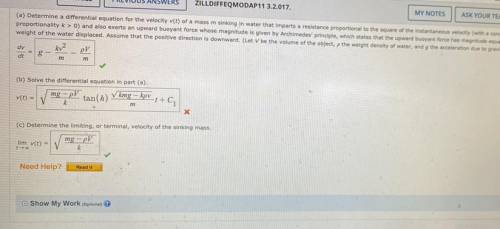
Mathematics, 15.09.2021 22:50, gobbler80
(a) Determine a differential equation for the velocity v(t) of a mass m sinking in water that imparts a resistance proportional to the square of the instantaneous velocity (with
is given by Archimedes' principle, which states that the upward buoyant force has magnitude equal to the weight of the water displaced. Assume that the positive direction is
acceleration due to gravity.)
dv ku2
PV
dt
g-
m
m
(b) Solve the differential equation in part (a).
v(t) =
mg-PV
.2
k
mg -pykt
k
- +
m
X
(c) Determine the limiting, or terminal, velocity of the sinking mass.
lim v(t) =
mg - PV
k
t-
Need Help?
Read It


Answers: 3
Other questions on the subject: Mathematics

Mathematics, 21.06.2019 15:40, chaparro0512
If the slope of one line equals the slope of another line then ? a) the two lines are intersecting lines b) the two lines are perpendicular lines c) the two lines are parallel lines d) the two lines always have very steep slopes
Answers: 3

Mathematics, 21.06.2019 19:00, filthyfish
Teams of 4 are competing in a 1/4 mile relay race. each runner must run the same exact distance. what is the distance each teammate runs?
Answers: 1

Mathematics, 21.06.2019 19:20, Courtneymorris19
Which of the following is the result of expanding the series
Answers: 1

Mathematics, 22.06.2019 00:00, jhenifelix
Cd is the perpendicular bisector of both xy and st, and cy=20. find xy.
Answers: 1
Do you know the correct answer?
(a) Determine a differential equation for the velocity v(t) of a mass m sinking in water that impart...
Questions in other subjects:

Mathematics, 05.04.2020 04:09

History, 05.04.2020 04:09

Mathematics, 05.04.2020 04:10

Mathematics, 05.04.2020 04:10




Mathematics, 05.04.2020 04:11

Biology, 05.04.2020 04:11







